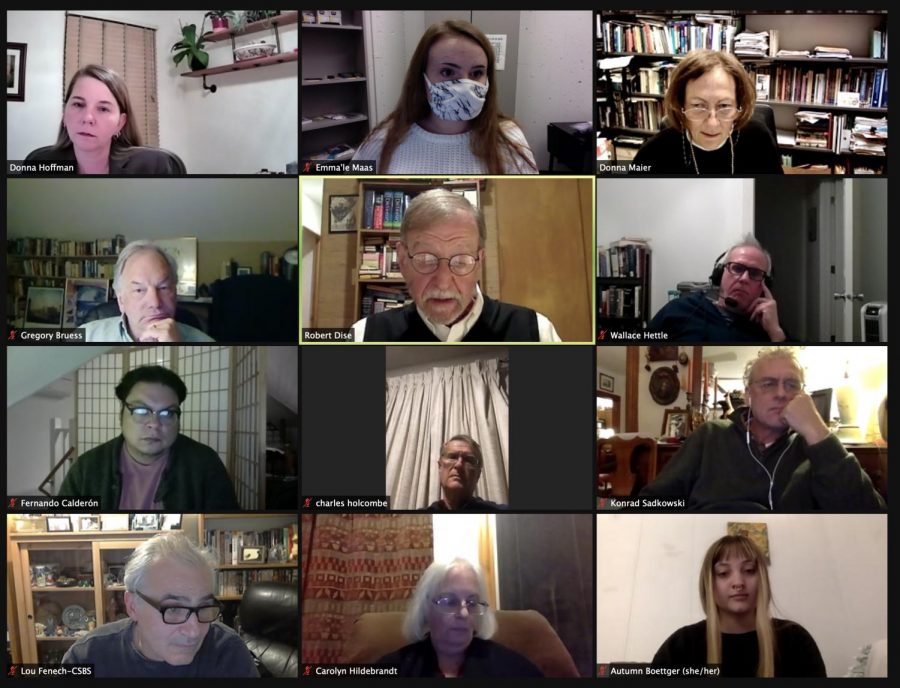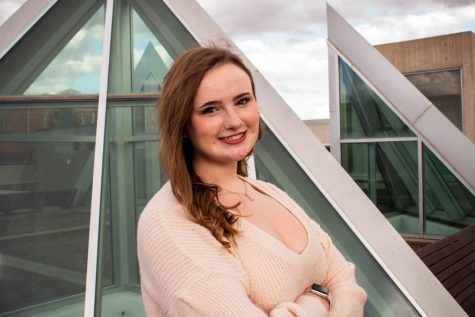Profs compare past, present politics
Professor of history Robert Dise addresses attendees at a virtual roundtable on Oct. 21 in which four UNI professors discussed how past political events may manifest themselves during the 2020 presidential election.
Oct 26, 2020
On Wednesday, Oct. 21, Phi Alpha Theta of the UNI History Department hosted a roundtable featuring four short lectures discussing past politics in comparison to today’s political climate. Participants in the discussion were Professors Robert Dise, Fernando Calderon and Donna Maier of the Department of History, along with Professor Donna Hoffman of the Department of Political Science.
Among many topics, the professors discussed different consequences the current administration faces in regards to its handling of immigration and foreign policy.
“We don’t even have any good foreign correspondence anymore; there’s no room for international affairs or international issues,” Maier said. “It’s the worst effect of having the toxic presidency we’ve had.”
Calderon, who served as an expert on the Latin American point of view of the election, added to this idea as well.
“In a less academic way, when the first commentary about election fraud came out, all my Latin American friends would call me and tell me, ‘How does it feel now?’” he said.
According to Calderon, the current president’s downfall is his encouragement of certain rhetoric.
“Racists don’t ask people if they’re legal or not before making a racist remark,” Calderon said.
That being said, neither prospective administration seemed to appeal to the roundtable participants.
“In no way am I trying to make Biden into some knight in armor for immigration, because he is not that,” Calderon said.
Dise used his lecture time to focus on the historical perspective, discussing Athens, Greece in the fifth century. He said that Athens has the first democratic constitution on record, and that a very hot topic in the current climate, election fraud, is a timeless issue.
“Voter suppression, as we would call it today, is as old as democracy itself,” he said.
Hoffman presented on the topic “What the 2000 Election Teaches Us About 2020,” drawing similarities and making educated guesses as to the possible outcomes of the nearing election. She highlighted four key points surrounding when the results may be finalized, as well as how the popular vote does not determine the president, as seen in 2016.
Hoffman also reminded the audience that voting is up to the states, so each state has a different process, and each process takes a different amount of time. This process can go all the way down to the look of the ballot itself, as brought up by the butterfly ballots of 2000 in Florida.
The electoral college this year does not vote until Dec. 16, and although litigation may follow, that does not mean it would be brought to the Supreme Court, as it was in the 2000 election with Gore v. Bush.
“We may not know (the election results) on November 3, and that’s okay,” she said.
Maier, who focused her lecture on foreign affairs, evaluated the current nominee’s foreign policies and their reluctance to bring them up in debates.
“Trump, he would be nuts to run on his foreign policy, because, first of all, he has none,” she said. “Biden knows he has no votes on foreign policy, so he knows better than to bring it up as well.”
Maier tied these “forgotten foreign policies” to the interest of the public as well.
“All politics is local,” she said. “Maybe sometimes they think in big pictures, but for the most part everyone thinks in their local issues, their local taxes, their local domestic issues.”
In concerns of the current president’s claim to not accept the results of the election, Hoffman cited the U.S. Constitution itself.
“The United States has always had a peaceful transfer of power,” she said. “The Constitution is very clear that if Trump were to lose and Biden wins, the new president will be initiated on January 20th.”
Hoffman also expressed the importance of the vote.
“There is always error in an election. The error only becomes important when the election is very close. What we need to hope for is clear results,” she said. “We need people to, one, have a plan to vote, two, to vote and then let the people make their choice.”









